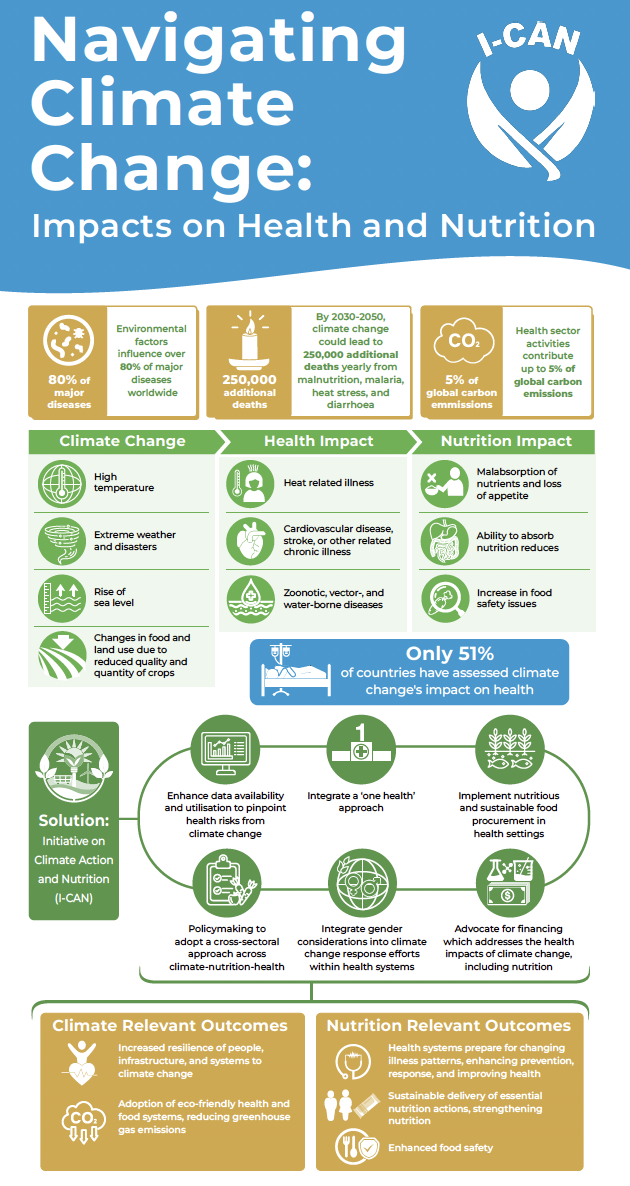Environmental factors impact human health and nutrition through various pathways, and these impacts can be felt disproportionately by already vulnerable groups like women and children. These include:
Rising temperatures: The impacts of climate change act as threat multipliers for both environmental and nutrition fronts. Not only do they threaten food and water security, but rising temperatures are linked with higher rates of stunting in children due to impaired nutrient absorption, reduced food intake, and increased incidence of infectious diseases.
Extreme weather events: Floods, droughts, and heatwaves can directly cause injuries, deaths, and displacement, while also contaminating water sources and spreading infectious diseases. Loss of biodiversity and precipitation changes create new habitats for disease vectors like mosquitoes and ticks, leading to more cases of malaria, Lyme disease, and other vector-borne illnesses which in turn can reduce the ability to absorb nutrients and worsen malnutrition
Water and soil contamination: Polluted water sources and contaminated soil can lead to the ingestion of harmful chemicals, heavy metals, and pathogens. This can cause gastrointestinal issues, neurological problems, and developmental delays, especially in children. Unclean water sources and a lack of sanitation present a risk to food safety and can increase food-borne diseases
Compounding health inequalities: Additionally, these factors exacerbate existing health conditions and disproportionately affect marginalised communities. People living in poverty or developing countries often have limited access to resources, healthcare, and social support systems. Climate change can worsen existing inequalities, making those with pre-existing conditions like respiratory illnesses more vulnerable to the health impacts of climate change.
Climate change poses a substantive risk to human health, but only half of countries have assessed the associated impacts.
By addressing these various environmental pathways in an integrated manner, the Initiative on Climate Action and Nutrition (I-CAN) aims to improve health and nutrition outcomes, especially for vulnerable populations like women and children who often bear the brunt of these environmental challenges. I-CAN was launched to bridge this climate-nutrition gap, and it seeks to:
Draw awareness to the linkages between climate change and nutrition through several pathways including health
I-CAN brings together diverse stakeholders to articulate a common, compelling narrative around the critical nexus of climate change and nutrition.
Generate evidence to better equip health systems and policymakers
I-CAN strengthens the evidence on how climate change and nutrition are interconnected and identifies integrated actions to accelerate progress on both fronts. This includes supporting climate change and health vulnerability assessments that incorporate nutrition metrics.
Promote financing for efforts that achieve nutrition and environment co-benefits
I-CAN works to mobilise resources and support the implementation of policies, strategies, and programs that deliver sustainable, resilient, and healthy diets - a critical link between nutrition and climate change.
By addressing climate change and malnutrition in an integrated way, I-CAN aims to unlock win-win solutions that can generate multiple benefits across the Sustainable Development Goals.
Contact us

Jessica Colston
Lead, Environment and Nutrition

Taotao Li
Junior Associate - Environment
